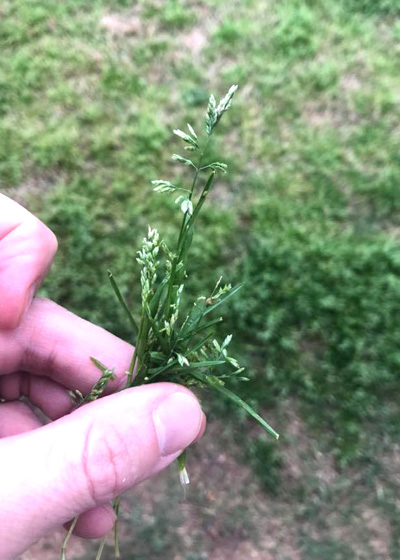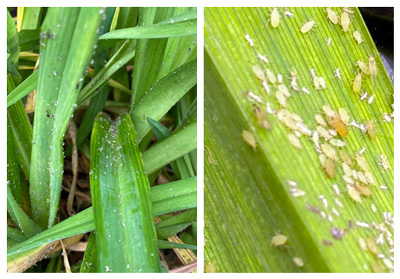Questions of the Week – March 19, 2020: First Pair
I’ve had several questions asked of me and posted to Facebook this week that I thought might be worthy of sharing with my e-gardens readers. Here are the first two.

1. “What is this weed growing all over my yard? What can I do to control it?”
This is annual bluegrass (Poa annua). It’s the most common cool-season grassy weed in America, growing from the Midwest clear to Mexico and from coast to coast. Here are the facts you’ll need to know:
• Germinates in late September and October. Grows slowly first half of the winter. Proliferates as weather begins to warm in February.
• Seedheads begin to appear in late February and are prolific by March and April.
• In Texas it dies with the heat of late April and May.
• Entire plant at maturity, seedheads and all, will be the size of a grapefruit. And, at the other extreme, you can’t mow it close enough. Annual bluegrass grows in golf greens where it’s mowed at less than ¼-inch.
• Your only means of controlling it is to apply pre-emergent weedkiller granules before the seeds ever sprout. Timing is last week of August through first week of September.
• Product to apply: Dimension, Halts or Balan, but only the one time just before Labor Day. If you’re late on the application you’ll have the weed for another spring.

2. “I think I have aphids covering my daylilies. Will they ruin the plants?”
Aphids are common on daylilies and many other plants in early spring. Here are your prime facts to remember:
• Aphids give rise to living young without mating, so populations can increase almost overnight.
• Aphids’ colors will vary from green to white to yellow to orange to black and others.
• Size will vary from pinhead-sized to BB-sized.
• They will always be pear-shaped, and they will always have twin “exhaust pipes” sticking out of the sides of their bodies.
• They are sucking insects that can carry diseases and that can cause puckered, distorted growth.
• Aphids are easily controlled by many organic or inorganic insecticides, or you may be able to blast them off the leaves with a hard stream of water.
